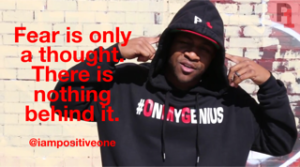
Love is unconditional therefore love is incapable of judging.
Fear is a stranger to the ways of love. Identify with fear and we will be a stranger to ourselves. (A Course In Miracles) The acknowledging of fear binds your thoughts and creates confusion, doubt, an anxiety which are emotions not recognized by love.
Every living creature on this earth was created with love. It is impossible for love recognize an emotion that it did not create. Love is perfect and embodies all living things. Love is not of the body. Love is a frequency that vibrates from your core thoughts. Love is an experience that can’t be described. It can only be felt when you are in its presence.

“So, first of all, let me assert my firm belief that the only thing we have to fear is…fear itself — .” -President Franklin D. Roosevelt
We have the ability to build love from within by mastering our ability to control our thoughts. Mind control opens our pathways to our consciousness. As our consciousness evolves, we begin to become aware of what is real externally because we understand ourselves internally. When a person understands something works they become more confident in their abilities.
Confidences brings stable emotions, which is the key component to allowing our minds to remain at peace. Emotions are like storm clouds passing in the sky. They come and go but they cannot possibly be real since they are constantly in a state of change. In other words: the clouds cannot block out the sun. Knowing allows us to only listen to the one voice from within. This is the voice I like to call your personal “I AM”
When people are understanding of the environment that they are in then they fear less things. Society has a history of fearing the unknown. By eliminating fear in our vocabulary, we automatically elevate our thinking simply because we are not being held down by the negativity in our world that creates this idea we must fear things. The ego needs the idea of fear to survive. It is the our egos job to create the fear to cause one to doubt themselves.
The reason people do not pursue their dreams is simply because of the fear of not knowing. Fear comes upon us when the illusion that we have created in our mind is being threatened. Fear is because of a lack of mind awareness. All emotions are derived from a relative of fear.
How would you operate in a world where you feared nothing? What could you accomplish?
4 Ways to help you deal with stress:
- Surround your environment with positive words.
– Fear causes us to always look at the negative which reinforces to our minds that the world is a scary and danger place. - Find a purpose or passion in life.
– By finding a purpose your focus automatically goes to a “can do” mentality.
– Your passion is what drives you through life.
– Ask yourself “why” do you get up in the morning. If you don’t know start thinking about it… NOW! - Get outside and enjoy nature.
-Being in Nature reduces fear and anxiety and increases pleasant feelings. - Meditate. Meditate. Meditate.
– There are so many Benefits to Meditation it is essential to physical mental and spiritual happiness.
References
Website
- Reflective Practices : This website offers how-to videos on meditation and yoga, as well guided meditations and information on other reflective (and calming) activities, such as creative therapies and journaling.
- Books and Articles
- Friedman, H., Martin, L. (2011). The longevity project. New York: Plume Book, Penguin.
- Fredrickson, B. (2009). Positivity. New York: Three Rivers Press.
- Hanh, T. (2000). No death, no fear: Comforting wisdom for life. Berkely, CA: Parallex Press.
- Niles, F. (2013). Five Ways to Live Courageously. Huffington Post. July 6, 2013. Accessed July 10, 2013 at http://www.huffingtonpost.com/frank-niles-phd/how-to-be-courageous-_b_3527678.html
- Ropeik, D. (2004). The consequences of fear. EMBO Reports, 5(1), 56.
- Southwick, S., Charney, D. (2012). Resilience: The science of mastering life’s greatest challenges. New York: Cambridge University Press.
- Yoder, C. (2005). The little book of trauma healing. Intercourse, PA: Good Books.

0 Comments